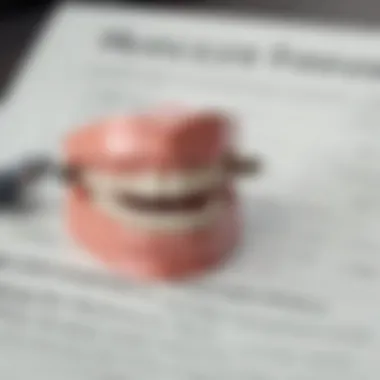Understanding Medicare Dental Coverage: Key Insights


Intro
Navigating the maze of Medicare can be quite a chore, especially when it comes to dental care. Many folks believe that once they enroll, every health need is covered, including their pearly whites. However, that’s not entirely the case. To truly understand how Medicare handles dental coverage, it's crucial to separate fact from fiction.
When it comes to dental services, Medicare is notorious for its limitations. While it provides essential health benefits, routine dental care often falls through the cracks. Knowing what Medicare covers and what it doesn’t can make a world of difference in your healthcare planning. This primer will break down those nuances, clarify common misconceptions, and guide you toward optimal dental health within the framework provided by Medicare.
So, let's dive into the specifics and arm ourselves with the knowledge necessary for making informed decisions regarding Medicare and dental care.
Intro to Medicare and Dental Services
The intersection of Medicare and dental care can often feel like navigating a minefield. With a large swath of the population relying on Medicare as their primary health insurance, understanding what’s covered, and how it translates to dental health, is critical. Dental services are often seen solely as cosmetic, but the truth is, oral health plays a pivotal role in overall health.
Diving into Medicare’s coverage of dental services reveals a landscape filled with nuances and complexities. From preventive care to more extensive procedures, it’s essential to grasp what Medicare can provide and where it falls short.
This article aims to demystify these ins and outs, empowering individuals to make informed healthcare choices, particularly regarding dental well-being. Knowing the parameters of coverage can prevent unexpected expenses down the road.
Understanding Medicare Basics
Medicare is a federal health insurance program primarily designed for people aged 65 and older, as well as some younger individuals with disabilities or specific medical conditions. Generally divided into different parts, including Part A (Hospital Insurance) and Part B (Medical Insurance), it covers a broad range of services but often excludes essential dental care.
Beneficiaries might think that having Medicare means they can easily access dental services. However, in many cases, routine dental work like cleanings, fillings, or even extractions will not be part of the coverage. Thus, understanding these basic tenets of Medicare is crucial for anyone relying on it as their main health insurance.
The Role of Dental Care in Overall Health
Oral health is inextricably linked to overall health, extending beyond just bright smiles. Poor dental hygiene has been associated with several critical health issues, such as heart disease, diabetes, and even pregnancy complications.
When dental problems arise and go untreated, the repercussions may not be limited to discomfort. Left unchecked, a simple cavity can lead to infections that affect much more than just the mouth. This connection only underscores the importance of preventive dental care.
Investing in dental health can yield significant benefits, not only for the mouth but for the body as a whole. Making informed choices about dental coverage and care is essential, particularly for Medicare beneficiaries who need to be aware of what isn’t covered under their plans.
Coverage Limitations of Medicare
Medicare offers a safety net for many Americans, but when it comes to dental care, its coverage can often leave beneficiaries scratching their heads. The limitations are significant, and understanding them is crucial for anyone navigating this complex aspect of healthcare. This section elaborates on these limitations, aiming to shed light on what Medicare truly covers regarding dental services while also highlighting the implications for beneficiaries.
What Dental Services are Excluded
As part of the Medicare framework, dental coverage is not as robust as one might expect. Many people find out the hard way that standard services, such as routine cleanings and restorative procedures, are excluded from Original Medicare plans. Here’s a digest of the most commonly excluded services:
- Routine cleanings and check-ups: Regular cleanings which are essential for preventive dental care go unrecognized.
- Fillings and extractions: Even basic procedures like filling cavities or having a tooth pulled typically fall outside of coverage.
- Bridges and crowns: These restorative treatments are crucial for maintaining dental health but aren’t covered.
- Cosmetic procedures: Anything that might be deemed as enhancing appearance instead of health, like teeth whitening or veneers, is not a covered expense.
Essentially, these exclusions can lead to unexpected out-of-pocket expenses for beneficiaries, who may believe they are entitled to more comprehensive care. This limitation hinders many from accessing necessary dental services and can leave them struggling with deteriorating dental health for lack of affordability.
Understanding Preventive vs. Major Dental Care
To comprehend the full scope of Medicare’s dental limitations, one must differentiate between preventive and major dental care. Preventive care, aimed at avoiding dental issues before they arise, is critical for long-term health and financial savings. Major dental care, on the other hand, usually encompasses more intensive and costly procedures that are often required after preventive measures fail.
- Preventive Dental Care:
- Major Dental Care:
- Examples: Routine check-ups, fluoride treatments, and professional cleanings.
- Medicare Coverage: Unfortunately, these services are typically not covered under Original Medicare.
- Importance: Preventive care can effectively decrease the risk of severe dental issues and their associated costs down the line.
- Examples: Root canals, dentures, and advanced surgical procedures.
- Medicare Coverage: Depending on specific circumstances, some aspects of major dental care may qualify for coverage under Medicare, especially when they are inherently linked to another medical condition.
- Importance: Such procedures can be exceptionally costly, highlighting the out-of-pocket burden placed upon beneficiaries when initial preventive care is neglected.
In understanding these dynamics, beneficiaries can better navigate their options and seek supplemental insurance plans that can fill the gaps left by Medicare’s limitations. Adapting a proactive approach to dental health, including seeking affordable dental plans, can not only secure a healthier smile but also ensure that financial obstacles don't derail access to necessary care.
"It's often said that an ounce of prevention is worth a pound of cure, but under Medicare, many don’t have the option to even weigh the scales."
Navigating the limitations of Medicare’s dental coverage provides essential insights into personal health strategies, urging beneficiaries to seek alternative methods to protect their dental health.
Types of Dental Services and Their Coverage


Understanding the types of dental services covered under Medicare is essential for beneficiaries to make informed decisions about their oral health. Medicare's policies can sometimes be hard to navigate, yet knowing which services are typically included, or at least what conditions may allow coverage, can save beneficiaries both headaches and costs. The following sections will break down the various dental categories and what Medicare may or may not cover.
Routine Check-ups and Cleanings
Routine check-ups and cleanings play a crucial role in maintaining dental health. Unfortunately, Original Medicare does not provide coverage for these services. This exclusion often leaves many seniors perplexed, especially since keeping teeth healthy can prevent more severe issues down the line.
Regular visits to the dentist can lead to early detection of problems like cavities or gum disease, potentially saving significant costs from more invasive procedures later. As tempting as it might be to skip these appointments, doing so could mean greater dental bills in the future.
You might think, "If my teeth feel fine, why bother?" but as they say, prevention is better than cure. Medicare beneficiaries should consider dental plans outside of Original Medicare to secure coverage for these basic services. Look for plans that specifically include routine care. Here’s a snapshot of what some beneficiaries might need:
- Regular cleanings every six months
- X-rays to detect hidden issues
- Examinations to catch problems early
Dental Procedures Covered Under Specific Conditions
While Medicare generally does not cover dental services, there are certain instances where coverage does kick in. According to the guidelines, repairs and procedures that have a direct connection to overall health may be covered. For example, services rendered in conjunction with a medical procedure can sometimes qualify. Here’s how it generally breaks down:
- Extractions needed for cancer treatment
- Dental procedures that must be performed as part of a treated medical condition
- Surgical services directly related to a medical diagnosis such as jaw issues that affect vital functions
This specification can create great confusion for many. Beneficiaries often find themselves wondering if a service qualifies. It’s advisable to consult with both your dental provider and your Medicare representative to clarify what conditions might allow for coverage.
Oral Surgery and Emergency Care
Oral surgeries, often essential for correcting structural issues or in emergencies, present a unique case in Medicare coverage. While routine dental care is largely not covered, there are exceptions in emergency scenarios. If a dental condition arises necessitating surgery to address pain or infection, beneficiaries may find themselves eligible for coverage. The catch? It must be deemed an emergency.
Here are common situations where coverage might apply:
- Impact teeth extractions due to pain or infections
- Surgical treatments linked to underlying medical conditions
- Facial injuries requiring immediate dental surgery to prevent severe complications
In these cases, documentation and justification of the medical need are essential. Medicare might provide coverage, but the path to approval could be winding and sometimes requires persistence. Knowing when to push for coverage can make all the difference.
Before undergoing any dental procedure, take the time to explore options and have a clear discussion with your healthcare provider about coverage possibilities.
Understanding the nuances of dental services under Medicare is no small task. Beneficiaries should stay informed and proactive in managing their healthcare, as the right information can lead to better decisions regarding not just their dental health but their overall well-being.
Navigating Medicare Plans for Dental Care
Understanding how to navigate Medicare plans for dental care is essential for anyone looking to manage their oral health under the Medicare framework. With the complexity of choices available, having a solid grip on the nuances can make a world of difference.
It’s not just about finding a plan; it’s about ensuring that the plan you choose aligns with your specific dental health needs and financial situation. A good plan can lead to significant cost savings and peace of mind when it comes to dental treatments.
Original Medicare vs. Medicare Advantage Plans
When it comes to dental coverage, Original Medicare differs substantially from Medicare Advantage Plans, also known as Medicare Part C. Original Medicare primarily covers hospital stays and physician services, without providing routine dental coverage. If you're enrolled in Original Medicare, you might find yourself at a loss when it comes to general dental care. For significant dental work, like fillings or extractions, Original Medicare has its limitations.
On the flip side, Medicare Advantage Plans often incorporate dental coverage as part of their offerings, but the specifics can vary widely among providers. Some plans might cover basic preventive care, such as cleanings and check-ups, while others might go as far as offering benefits for root canals or crowns, depending on the plan selected.
Moreover, once you join a Medicare Advantage Plan, you might also be entrusting your care to a network of providers, which can greatly influence your access to necessary dental services. Here’s a snapshot of what you might expect:
- Original Medicare
- Medicare Advantage Plans
- Does not cover routine dental care.
- Covers dental procedures only if part of inpatient hospital care.
- Often include dental coverage.
- Coverage details vary widely based on the chosen plan.
Supplemental Insurance Options for Dental Coverage
For those wanting enhanced dental benefits beyond what Original Medicare offers, looking into supplemental insurance could be beneficial. There are policies specifically tailored to provide the additional support for dental services that Medicare may not cover.
These supplemental plans can fill the gaps in coverage by potentially offering benefits for:


- Preventive services, such as regular cleanings and x-rays.
- Restorative work, including fillings and crowns.
- Emergency dental care required in urgent situations.
It's also prudent to review each policy's fine print to ensure it aligns with your expectations and provides access to a broad range of dental providers. Some key factors to consider include:
- Cost-sharing: Understand any premiums, deductibles, and copayments.
- Network restrictions: Are there limitations on which dental offices you can visit?
- Plan benefits: What specific services are covered?
As one makes this decision, it may be worth reaching out to organizations or forums that provide firsthand experiences, such as the Medicare subreddit or relevant Facebook groups.
"Navigating health insurance, particularly with Medicare, necessitates a thorough understanding of what’s available to you, emphasizing the importance of doing your homework before making decisions."
In summary, it's crucial to carefully consider your options regarding Medicare and dental coverage. Matching your dental health needs with the right Medicare plan can set the foundation for better oral health management.
Finding Dental Providers Accepting Medicare
Finding a dentist who accepts Medicare can feel like searching for a needle in a haystack. Thus, it’s crucial to navigate this process carefully. Many Medicare beneficiaries may not realize that dental coverage under Medicare is limited, which makes it even more essential to find the right providers who can meet their needs adequately.
One of the main considerations when looking for dental providers that accept Medicare is understanding the nature of the plan itself. Traditional Medicare does not cover most dental procedures. However, certain dental services, particularly those deemed medically necessary, might be covered. To capitalize on this, individuals need to find dentists who have experience working with Medicare patients.
This has myriad benefits:
- Tailored Care: Dentists familiar with Medicare requirements can better align their treatments with the coverage options.
- Cost Efficiency: Finding a participating dentist avoids unexpected expenses, ensuring that patients pay only what is necessary.
- Quality Assurance: Many Medicare-participating providers maintain a certain standard of care and are often recommended for their experience with older adults.
When researching, it’s also wise to reach out to your Medicare Advantage plan, if applicable. These plans can often direct you to their network of participating dentists, making the search that much easier.
Ensure you verify each provider’s acceptance of Medicare before scheduling appointments. This can save you from potential financial surprises down the line.
Researching Participating Dentists
To begin the research process for finding participating dentists, start by gathering a list of potential dentists in your area. This can be done through several channels:
- Medicare’s Official Website: Utilize the Medicare website to search for dentists who are part of your plan.
- Local Health Clinics: Many community health centers may have records of dentists that accept Medicare.
- Online Reviews: Websites like Yelp or Healthgrades often provide insights into patient experiences with particular dental practices.
Once you have a list, consider calling each office directly to inquire about their acceptance of Medicare. Be sure to ask specific questions related to your dental needs, as it’s important they can provide appropriate services according to what your coverage allows.
Additionally, don't overlook the power of word-of-mouth referrals from friends or family. They can provide firsthand accounts of their experiences with specific dentists, which can help you narrow down your options.
Understanding Provider Networks
Understanding how provider networks function is key to making the most out of your Medicare dental coverage.
- In-Network vs. Out-of-Network: Many Medicare Advantage plans have predetermined networks of dentists. Using in-network providers usually means lower out-of-pocket costs than going out-of-network.
- Referrals: If a specific dental service is not available within your network, your provider might be able to refer you to someone who can meet your needs without straying from your plan's coverage.
- Annual Limits: Some plans may also enforce annual spending limits on dental coverage. Therefore, it's important to clarify what costs are covered under your specific plan, which can give you a clearer perspective on which providers to choose for your dental care.
As you navigate this complex area, remember that diligent research can save both time and money in securing the dental care you need. Knowing which providers work with Medicare and how their networks operate will put you in a better position when you seek dental treatment.
Strategies for Managing Dental Expenses
Managing dental expenses, particularly under Medicare, can often feel like traversing a minefield. While Medicare provides some coverage, it does not fully cover dental services, leaving beneficiaries with significant out-of-pocket costs. Thus, exploring effective strategies to manage these expenses becomes crucial. Understanding how to manage dental costs can not only lessen the financial burden but also ensure better access to necessary dental care.
Exploring Payment Plans with Dentists
When faced with high dental bills, one of the first avenues to consider is establishing a payment plan directly with your dentist. Many dental offices are open to offering this option. Here’s why this matters:
- Affordability: Instead of paying the total amount upfront, dentists can divide the cost into smaller, more manageable payments. This allows you to receive needed treatment without the immediate financial burden.
- Negotiation: Don't shy away from discussing your financial situation. It’s perfectly acceptable to ask if they have any payment plans, discounts, or even alternatives to the suggested treatment that might be more affordable.
- Medical Financing Services: Some dentists partner with financing companies that cater specifically to dental expenses. Services like CareCredit allow patients to undergo treatment without breaking the bank, offering interest-free promotional periods.
Ultimately, communicating openly with your dentist about financial concerns can lead to more personalized care plans that are economically prudent.
Utilizing Flexible Spending Accounts
Flexible Spending Accounts (FSAs) are another tool that can help offset dental care costs. These accounts allow you to set aside pre-tax income to pay for eligible health expenses, including some dental work. Here’s how tapping into an FSA can be beneficial:


- Tax Advantages: Contributing to an FSA reduces your taxable income, which can save you a chunk of change come tax season.
- Budgeting for Care: By allocating a certain amount to your FSA at the beginning of the year, you can effectively budget for anticipated dental expenses and ensure the funds are available when needed.
- Broad Coverage: FSAs can cover various dental costs not included under Medicare—such as braces or cosmetic dentistry, making it a versatile option for many households.
While managing dental expenses through FSAs, remember to plan wisely since these accounts often have a "use-it-or-lose-it" policy; unused funds may vanish at year’s end unless your employer offers a grace period.
"Proper planning an financial tools, such as payment plans and FSAs, can make a worlds of difference in managing dental expenses under Medicare."
The combination of these strategies can help navigate the tricky waters of dental care expenses while still ensuring the health of your smile. In exploring these avenues, beneficiaries find a clearer path to dental care that does not shatter their financial straits.
The Importance of Preventive Dental Care
Preventive dental care is like a solid cornerstone for a well-built house. It's about establishing good habits and reducing potential issues that could escalate into greater problems down the line. Understanding how preventive care fits into Medicare dental coverage is critical for maximizing benefits and ensuring oral health, especially for those navigating the complexities of the healthcare system.
How Preventive Care Can Reduce Costs
Engaging in preventive care is not just about maintaining a bright smile; it’s a savvy financial move. A regular dental checkup can catch issues like cavities or gum disease before they require costly treatments. For instance, a simple filling or cleaning is a fraction of the cost compared to more extensive procedures like root canals or crowns. The old adage "an ounce of prevention is worth a pound of cure" rings especially true here.
- Routine cleanings, often covered partially by Medicare, can help remove plaque buildup and stave off bigger issues.
- Early detection of problems not only leads to less invasive treatments but can also reduce the need for future specialist interventions.
By investing time in preventive care, individuals can save significantly on future dental expenses. It allows for a proactive approach to health, where the focus is on keeping teeth and gums healthy rather than reacting to problems as they arise.
Encouraging Routine Dental Visits
Promoting routine dental visits is a pivotal step in maintaining oral health. Even with the constraints of Medicare's coverage, emphasizing the importance of these visits can help break the cycle of neglect that often leads to serious dental issues.
Encouragement can come from various avenues:\n 1. Health education programs that outline the benefits of regular care.
2. Community outreach initiatives that provide resources for obtaining dental care help alleviate fears about the costs involved.
3. Family conversations where the significance of oral health is highlighted might motivate friends and relatives to prioritize visits as well.
When people understand that dental health significantly impacts overall health, they become more inclined to schedule those routine checks. It creates a culture of wellness, setting the stage for not just dental but holistic improvements in health.
"The mouth is a gateway to the body; keeping it healthy leads to better overall health outcomes."
Future Considerations for Dental Coverage
As the healthcare landscape evolves, the dialogue surrounding dental coverage under Medicare is gaining traction. This section examines critical aspects regarding the future of dental care coverage, particularly within Medicare. Understanding these factors is essential for all stakeholders — from policy-makers to seniors who depend on these services.
Trends in Policy Reforms
Recent trends suggest a growing movement towards policy reforms aimed at enhancing dental care benefits within the Medicare framework. More and more advocates are calling for more comprehensive coverage that not only includes routine check-ups but also major surgical procedures. Data indicates that untreated dental issues can lead to severe health problems, with consequences that reach far beyond oral health.
- Evidence of Health-Linked Benefits: Studies show that poor oral health is linked with heart disease and diabetes. As awareness of this connection increases, there's push for Medicare to adapt its coverage to reflect these new insights. This indicates a gradual recognition that dental care is integral to overall health, rather than a separate entity.
- Public Opinion Shifts: Polls reveal that a majority of Americans support including dental benefits in Medicare. This shift in public opinion places pressure on legislators to reconsider existing policies. As the demographic of older adults expands in number, the need for dental services will likely become a key component of campaign platforms for stakeholders.
Advocating for Enhanced Dental Benefits
In light of the ongoing conversations around Medicare and dental care, advocating for enhanced dental benefits is crucial. This advocacy can take various forms, affecting both individuals and communities at large.
- Grassroots Movements: Individuals can create grassroots movements to raise awareness of the importance of dental care; every voice matters. These groups can gather support through community forums, social media platforms, or petitions directed at legislators.
- Collaboration with Healthcare Professionals: Another angle involves collaboration between senior care groups and dental professionals. By working together to advocate for policy changes, they can pool resources and expertise to effectively communicate the necessity of such reforms.
- Legislative Engagement: Engaging directly with lawmakers can yield significant benefits. Writing letters, attending town hall meetings, or participating in advocacy days can amplify the call for change. Interested parties should clearly express the need for comprehensive dental benefits which align with general health coverage in Medicare.
- Data-Driven Arguments: Presenting data to support arguments for enhanced benefits is essential. Illustrating how preventive care can reduce long-term costs not only strengthens the case but resonates well with financial advisors and tax payers.
In summation, the dialogue regarding Medicare's dental benefits is ever-changing. By actively participating in advocacy efforts, we can shape a future where dental care is regarded as a fundamental aspect of overall health.
Closure
The conclusion of this article serves as a crucial point of reflection on the intricate dynamics of Medicare coverage for dental care. Given the complexities surrounding healthcare, especially for older adults, a solid understanding of how Medicare interacts with dental services is vital.
Recap of Key Points
To distill the conversation we've had:
- Medicare Basics: We've discussed the foundational elements of Medicare, establishing that it's often misunderstood regarding dental services.
- Coverage Limitations: It is clear that many common dental procedures are excluded, reinforcing the need for patients to navigate these limitations.
- Types of Dental Services: We pinpointed the difference between routine dental check-ups and more extensive procedures that might be covered under unique circumstances.
- Navigating Plans: Knowing the distinct advantages of Original Medicare versus Medicare Advantage could greatly influence one’s choice of plan.
- Finding Providers: The challenge of locating Medicare-accepting dental professionals was explored, crucial for ensuring that patients receive the care they need.
- Managing Expenses: We also highlighted various strategies for controlling out-of-pocket costs, emphasizing the importance of financial planning in healthcare decisions.
- Future Considerations: Lastly, we touched on how policy trends may shape dental coverage, amplifying the ongoing conversation about healthcare reform.
Final Thoughts on Medicare and Dental Care
As we reflect on these elements, it is essential to see Medicare not just as a maze of rules, but as a foundational component in managing overall health. Dental care is frequently sidelined in discussions, yet its implications on overall wellbeing are significant. Effective oral health can enhance one’s quality of life and reduce costs in the long run by preventing advanced dental issues.
For the stakeholders and readers who are professionals in finance and health sectors—whether they’re patenting a new way to integrate dental care solutions or analyzing trends in health policies—understanding this relationship is critical. Emphasizing the need for coherent benefits in Medicare ensures that individuals can make informed choices about their health and finances. Addressing the gaps in coverage through enhanced advocacy efforts or supplemental insurance can ultimately lead to better healthcare outcomes, ensuring the aging population remains healthy and vibrant.
Giving attention to dental care within the Medicare framework isn't just an academic exercise; it's about ensuring dignity and accessibility for those who have paid into the system throughout their lives. Navigating this landscape effectively can yield better health outcomes and promote a more holistic approach to patient care in the United States.















